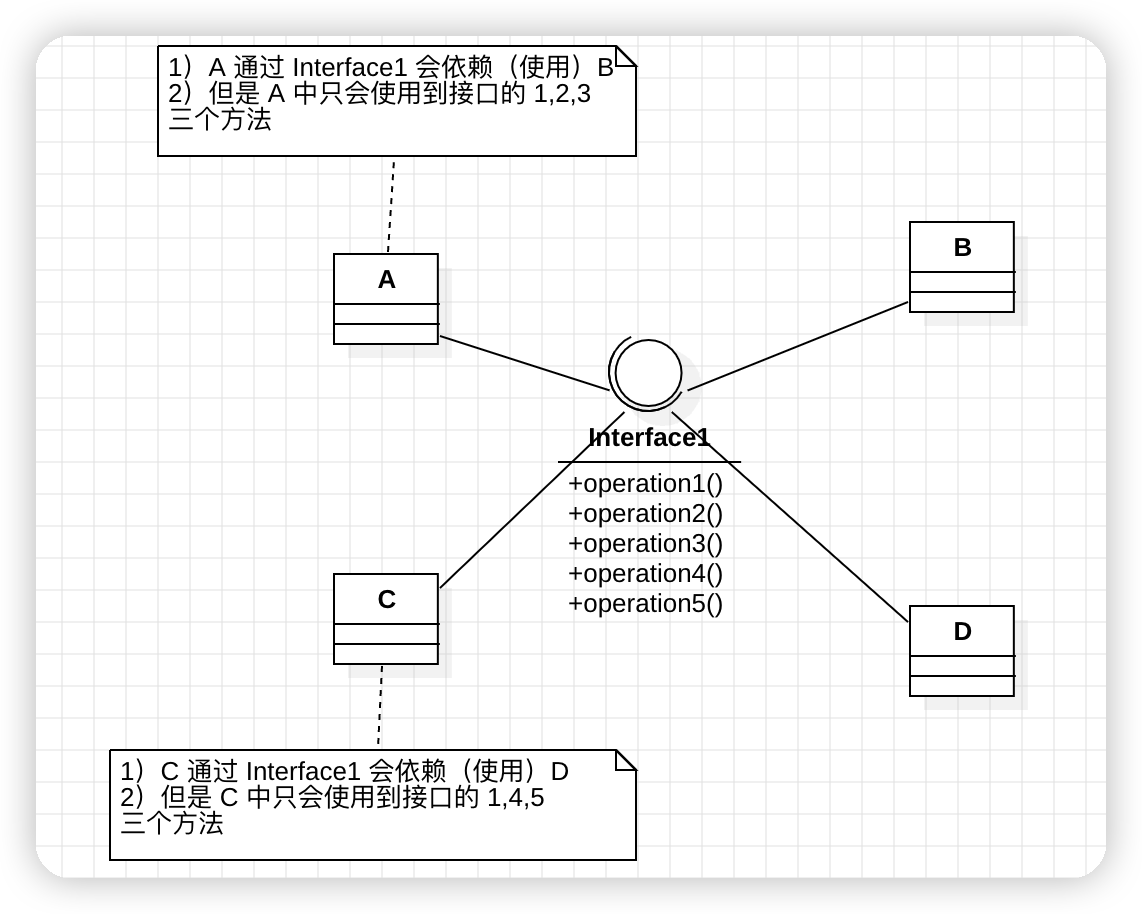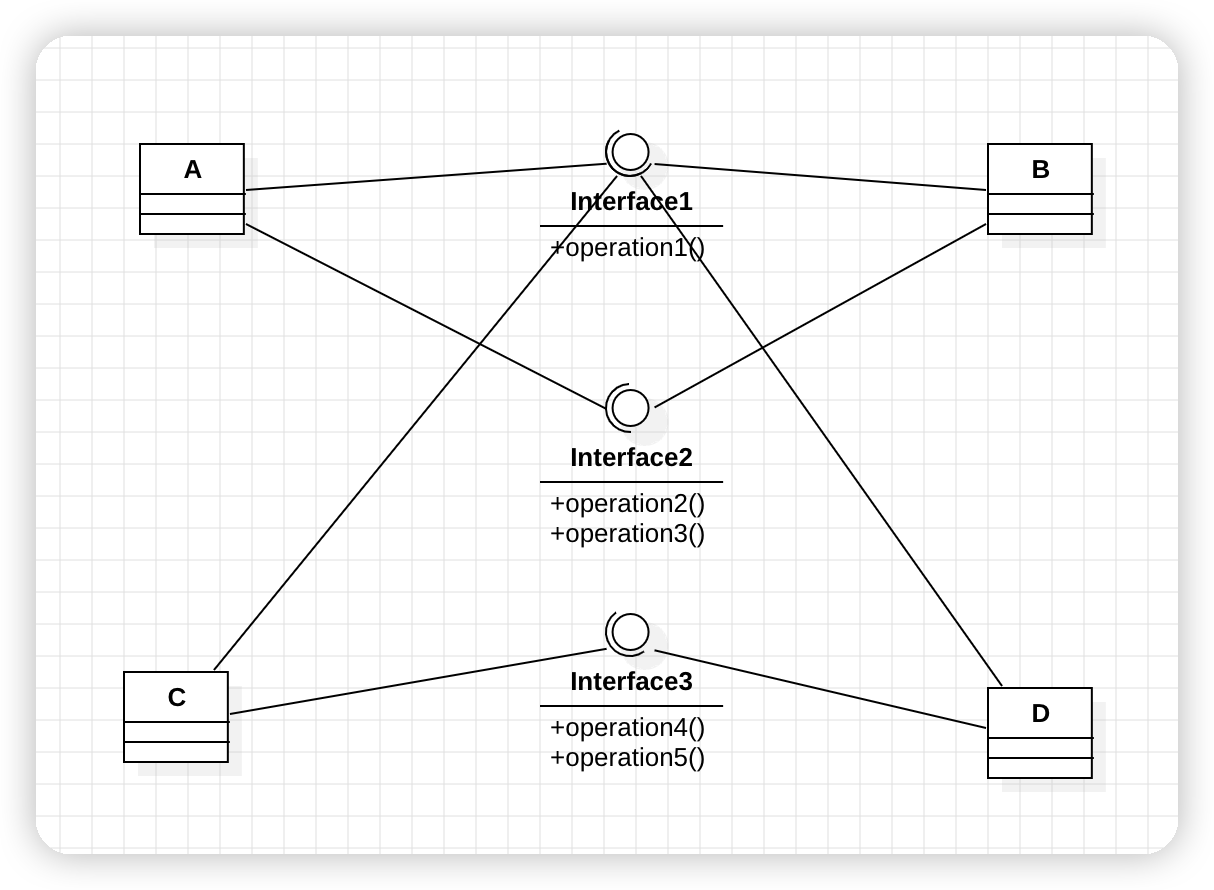1、基本介绍
1)客户端不应该依赖他不需要的接口,即一个类对另一个类的依赖应该建立在最小的接口上
2)先看一张图:

3)类 A 通过接口 Interface1 依赖类 B,类 C 通过接口 Interface1 依赖 D,如果接口 Interface1 对于类 A 和类 C 来说不是最小接口,那么类 B 和类 D 必须去实现他们不需要的方法。
4)按隔离原则应当这样处理:将接口 Interface1 拆分为独立的几个接口,类 A 和类 C 分别与他们需要的接口建立依赖关系。也就是采用接口隔离原则。
2、应用实例
1)类 A 通过接口 Interface1 依赖类 B,类 C 通过接口 Interface1 依赖类 D,请编写代码完成此应用实例。
2)代码如下:
package com.wenze.principle.segregation;
/**
* 接口隔离原则演示 01
*
* @author wenze
* @version 1.0
* @Date 2023-10-11 09:41:57
* @since 1.0
*/
public class Segregation1 {
}
interface Interface1 {
void operation1();
void operation2();
void operation3();
void operation4();
void operation5();
}
class B implements Interface1 {
@Override
public void operation1() {
System.out.println("B 实现了 operation1");
}
@Override
public void operation2() {
System.out.println("B 实现了 operation2");
}
@Override
public void operation3() {
System.out.println("B 实现了 operation3");
}
@Override
public void operation4() {
System.out.println("B 实现了 operation4");
}
@Override
public void operation5() {
System.out.println("B 实现了 operation5");
}
}
class D implements Interface1 {
@Override
public void operation1() {
System.out.println("D 实现了 operation1");
}
@Override
public void operation2() {
System.out.println("D 实现了 operation2");
}
@Override
public void operation3() {
System.out.println("D 实现了 operation3");
}
@Override
public void operation4() {
System.out.println("D 实现了 operation4");
}
@Override
public void operation5() {
System.out.println("D 实现了 operation5");
}
}
/**
* A 类通过接口 Interface1 依赖(使用) B类,但是只会用到 1,2,3方法
*/
class A {
public void depend1(Interface1 i) {
i.operation1();
}
public void depend2(Interface1 i) {
i.operation2();
}
public void depend3(Interface1 i) {
i.operation3();
}
}
/**
* C 类通过接口 Interface1 依赖(使用) B类,但是只会用到 1,4,5方法
*/
class C {
public void depend1(Interface1 i) {
i.operation1();
}
public void depend4(Interface1 i) {
i.operation4();
}
public void depend5(Interface1 i) {
i.operation5();
}
}
3、应传统方法的问题和使用接口隔离原则改进
1)类 A 通过接口 Interface1 依赖类 B,类 C 通过接口 Interface1 依赖类 D,如果接口 Interface1 对于类 A 和类 C 来说不是最小接口,那么类 B 和类 D 必须去实现他们不需要的方法
2)将接口 Interface1 拆分为独立的几个接口,类 A 和类 C 分别与他们需要的接口建立依赖关系。也就是采用接口隔离原则
3)接口 Interface1 出现的方法,根据实际情况拆分为三个接口

4)代码实现:
package com.wenze.principle.segregation.improve;
/**
* 接口隔离原则改进演示 01
*
* @author wenze
* @version 1.0
* @Date 2023-10-11 10:04:27
* @since 1.0
*/
public class Segregation1 {
public static void main(String[] args) {
final A a = new A();
a.depend1(new B());
a.depend2(new B());
a.depend3(new B());
final C c = new C();
c.depend1(new D());
c.depend4(new D());
c.depend5(new D());
}
}
interface Interface1 {
void operation1();
}
interface Interface2 {
void operation2();
void operation3();
}
interface Interface3 {
void operation4();
void operation5();
}
class B implements Interface1, Interface2 {
@Override
public void operation1() {
System.out.println("B 实现了 operation1");
}
@Override
public void operation2() {
System.out.println("B 实现了 operation2");
}
@Override
public void operation3() {
System.out.println("B 实现了 operation3");
}
}
class D implements Interface1, Interface3 {
@Override
public void operation1() {
System.out.println("D 实现了 operation1");
}
@Override
public void operation4() {
System.out.println("D 实现了 operation4");
}
@Override
public void operation5() {
System.out.println("D 实现了 operation5");
}
}
/**
* A 类通过接口 Interface1 依赖(使用) B类,但是只会用到 1,2,3方法
*/
class A {
public void depend1(Interface1 i) {
i.operation1();
}
public void depend2(Interface2 i) {
i.operation2();
}
public void depend3(Interface2 i) {
i.operation3();
}
}
/**
* C 类通过接口 Interface1 依赖(使用) B类,但是只会用到 1,4,5方法
*/
class C {
public void depend1(Interface1 i) {
i.operation1();
}
public void depend4(Interface3 i) {
i.operation4();
}
public void depend5(Interface3 i) {
i.operation5();
}
}


